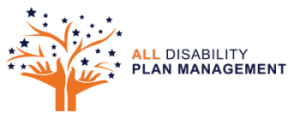The All Disability Plan Management Guide to NDIS Goal Setting.
Previously, we posted about NDIS goals: What they are and why they matter. In this post, we’re going to expand a little more on understanding and setting NDIS goals. Understanding and setting the right goals for you allows you to maximise the impact that your NDIS funding has on your life. Setting authentic, personal and achievable goals means that you’ll get the most out of your NDIS journey and can help you live the life you would like to live.
Why do I need to set goals for my NDIS plan?
The basis of receiving funding is for people living with disability to be supported to achieve their goals with the support of the NDIS.
Having clear goals allows the NDIS to understand why you require funds and how these funds will remove barriers and assist you to live a better life.
You will need to communicate your goals with your Local Area Coordinator during planning meetings so that they can better understand your current situation and what you would like to achieve with your plan.
Your goals are also taken into consideration by the NDIA when determining the approval of your plan. However, this doesn’t mean that the size or types of goals you set will increase or decrease the amount of funding you receive. This is why it’s important to make your goals authentic and personal to you.
Where to start when it comes to working out your goals
Working out our goals in life is not always easy! There are so many things to think about, where you are now, what you want, and where you’ll be in the future.
The key is not to put too much pressure on yourself. It can be helpful to start with a general brainstorm. Think about your current situation and visualise where you’d like to be in the future. What areas do you feel good and confident about, and what areas do you need support with to see improvement?
What are the things that you like doing that bring you joy and would like to be able to do more often?
Write down, or speak to a friend or family member about all of the things that come to mind when you think about what you would like to achieve in the short, medium and long term.
Once you have a bit of a list going, start to categorise what you have come up with. Some categories to get you started can include physical goals, social goals or independence-based goals.
Physical goals relate to your health and well-being.
You might like to be able to play a particular sport or maybe walk your dog without assistance. It may also be to obtain more support or equipment that allows your more mobility and freedom to leave the house or travel.
An example goal could be “I would like to be able to play soccer by next year” or “I would like to swim at the pool unassisted within the next 12 months”.
Social goals relate to your communication skills, social circle or broader social community.
You might like to make more friends, join a group or club or feel more confident and comfortable talking to new people.
An example would be, “I would like to have the confidence to join the local book club” or “I would like to see my friends at least once a week.”
Independence goals are to do with how you live day to day.
They might be to do with such things as mobility or even education and employment. Is there technology you would like to access to give you more daily freedom? Are there new skills you would like to learn?
An example goal would be “I would like to be able to cook for myself” or “I would like to find a job in the next 6 months”.
Once you have a general idea of your goals and categories, you might find the SMART framework useful when writing out your specific goals for your plan.
The SMART acronym is a well-known and used goal setting framework for many types of goals.
Specific - make your goal specific to you and an area within your life.
Measurable - your goal should be measurable in some way so that you can know how and when you’ll achieve it.
Achievable - your goal should be actually attainable.
Realistic - this ties into your goal being achievable. Setting realistic expectations avoids disappointment.
Timely - what is the timeframe you’d like to see this goal reached? It can be flexible, but dividing goals into short, medium and long term prevents overwhelm.
Another important tip when goal setting is flexibility.
Whilst it’s important that your goals are somewhat specific and tailored to you, it’s also important that there is a little wiggle room. By keeping the goal somewhat flexible, more supports can be used to help achieve that goal overall.
Circumstances can change with time, and you may shift from wanting to, say, a career in retail to working with animals. So in this instance, a more flexible goal would be to find employment, but the supports needed to do so would most likely stay the same.
When you’ve worked out and set your goals, you’ll go through them with your LAC or planner and look at the next steps to get your plan approved.
How can All Disability help with your NDIS goals?
All Disability offers NDIS plan management services to help you reach your NDIS goals. Once you’ve determined your NDIS goals, All Disability Plan Management can manage the financial aspects of your plan to verify that you have the supports and funding that you need.
Additionally, we regularly provide detailed reports so that you know how your funds are being used. Well thought out goals and a great plan manager are a winning combination to get the most benefit from your NDIS funding. Our services come at no cost to you since they’re included in your NDIS funding.
Get in touch to learn more about how personalised plan management can work for you.
Get in Touch Quiz: Is Plan Management Right for Me?





